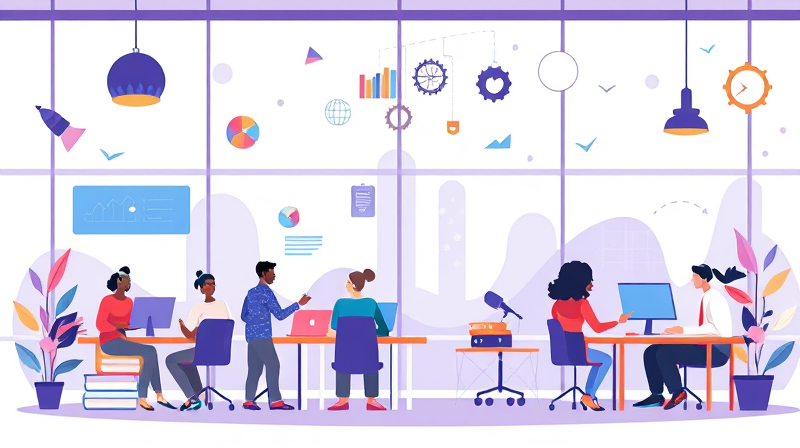In the hustle and bustle of modern life, our ability to remain focused can often feel overwhelmed by distractions and anxiety. However, mindfulness practices offer a beacon of hope for those seeking to enhance their concentration and cognitive performance. Engaging in these techniques not only improves attention but also builds resilience against the inevitable stresses of daily living.
Recent scientific studies have found a distinct link between mindfulness and improved cognitive control. As research from various prestigious institutions has shown, mindfulness practices help free up mental resources by reducing anxiety. This careful regulation of thoughts allows us to store and prioritize our goals more efficiently, ultimately leading to heightened focus and emotional balance.
The Science Behind Mindfulness and Focus
Neuroscientific research has pointed to the remarkable ways in which mindfulness exerts its influence on the brain. For instance, studies conducted at Washington University in St. Louis have highlighted that mindfulness practice can significantly improve our ability to regulate thoughts and actions. This is a vital skill for anyone striving to overcome distractions, as anxiety tends to occupy the brain’s working memory reserves.
Further findings from Harvard Health in 2024 demonstrated that even a short, daily mindfulness session spanning just eight weeks can have substantial benefits. Improvements in attention span, memory retention, mood stability, and even emotional regulation have all been linked to these mindfulness exercises. Notably, groundbreaking research at the Icahn School of Medicine at Mount Sinai revealed that meditation can noticeably alter the activity in deep brain regions such as the amygdala and hippocampus—areas intimately involved with emotion and memory.
The science behind it not only legitimizes these practices but also inspires individuals to adopt mindfulness as a tool for overcoming cognitive challenges.
Effective Mindfulness Techniques
One technique that has been particularly beneficial is Focused Attention Meditation. This practice requires you to direct your attention toward a chosen object, sensation, or process, such as your own breathing. With time, this method trains you to gently steer your mind back whenever it wanders, thereby reinforcing neural circuits responsible for concentration.
This method is especially useful for those prone to worry. Repeated practice enables you to remain anchored in the present moment, a skill that proves invaluable in stressful situations.
Another powerful mindfulness method is the Four-Step Exercise. Developed by medical experts in March 2025, this exercise is both science-backed and easy to integrate into even the busiest schedules. The exercise comprises a sequence of intuitive steps:
- Set a Timer: Designate 10 minutes in a quiet area each day to focus solely on the present.
- Choose a Sense: Direct your focus to a single sensory experience such as breathing, ambient sounds, or physical sensations.
- Acknowledge Mind Wandering: Accept that your mind may drift, labeling these distractions without judgment.
- Gently Refocus: Redirect your attention back to the chosen sense promptly.
This straightforward practice not only enhances concentration but also cultivates a greater sense of control over your reactions to stressful events.
Evolving Mindfulness Practices for a Changing World
In 2025 and beyond, mindfulness has evolved into far more than just a relaxation tool. With artificial intelligence weaving itself into the fabric of daily life, new techniques now address the anxiety and existential questions brought about by rapid technological change. Some experts, like Mindful Leader's CEO Mo Edjlali, emphasize that meditation tracks focused on achievement and intense focus are now in vogue. This evolution signals that mindfulness is adapting to support cognitive enhancement in our digital age.
Technology-induced stress is now a major concern for many. The inclusion of practices that balance both focus enhancement and stress management marks a significant shift. This dual-purpose approach is perhaps one of the most exciting aspects of mindfulness as it caters to the modern mind’s evolving needs.
Benefits Beyond Sharpening Focus
The advantages of incorporating mindfulness into your daily routine extend far beyond improved focus. Mindfulness practices have been associated with reductions in chronic pain, lowered levels of depression, and even enhanced emotional regulation. When the mind is at peace, these positive effects begin to ripple outward, benefiting both the individual and their surrounding community.
Moreover, mindfulness-based stress reduction (MBSR) is recognized as a robust method for cultivating heightened awareness, deep presence, and genuine resilience. As more research confirms these benefits, it becomes increasingly clear that there is an intrinsic connection between mindfulness and overall well-being.
By reducing stress and increasing self-awareness, mindfulness does more than help you concentrate—it fosters a healthier, more balanced way of living. The ripple effects of these practices can create environments that nurture peace, reducing the collective stress levels of communities and workplaces alike.
Taking the first step towards integrating mindfulness techniques into daily routines might seem challenging at first, but the rewards are undeniable. With steady practice, individuals can experience significant improvements in focus, cognitive clarity, and overall quality of life. Each mindful breath is an affirmation of the present moment, a reminder that our minds are capable of profound change and growth.
Ultimately, mindfulness practices empower us to cope with modern demands in a grounded, thoughtful manner. In embracing these techniques, you not only sharpen your focus, you also cultivate a resilient spirit that can thrive in an ever-changing world.








